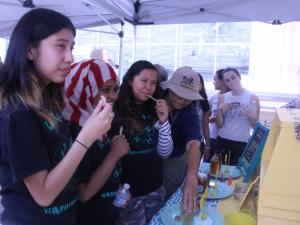University of DC’s Rooftop Garden hosts celebration of Pollinator Week
 A garden in the sky. That’s the best way to describe the Green Roof, a rooftop garden at the University of the District of Columbia (UDC), the nation’s only urban land grant university. This living laboratory is one of the latest features at UDC’s College of Agriculture, Urban Sustainability and Environmental Sciences (CAUSES), which is also home to the Center for 4-H & Youth Development. 4-H is the nation’s premiere youth development program, managed by National Institute of Food and Agriculture (NIFA).
A garden in the sky. That’s the best way to describe the Green Roof, a rooftop garden at the University of the District of Columbia (UDC), the nation’s only urban land grant university. This living laboratory is one of the latest features at UDC’s College of Agriculture, Urban Sustainability and Environmental Sciences (CAUSES), which is also home to the Center for 4-H & Youth Development. 4-H is the nation’s premiere youth development program, managed by National Institute of Food and Agriculture (NIFA). The event’s special guest was Dr. Ann Bartuska, Deputy Under Secretary for Research, Education, and Economics, USDA. Bartuska addressed the importance of pollinators and food security.
The event’s special guest was Dr. Ann Bartuska, Deputy Under Secretary for Research, Education, and Economics, USDA. Bartuska addressed the importance of pollinators and food security.“As part of the White House Pollinator Health Initiative, the USDA is investing in pollinator health through its Research, Education, and Economics mission area. Between FY 2008 and 2014, NIFA invested approximately $40 million in pollinator health research and education,” said Bartuska.
Bartuska was joined by Dr. Thomas Bewick, National Program Leader, Division of Plant Systems-Production, National Institute of Food and Agriculture, USDA, and UDC CAUSES Director of the Center of Sustainable Development, Dr. Dwane Jones. Sandy Farber Bandier, UDC Green Roof Master Gardner Coordinator and UDC extension agent, led the tour of the 40,000 square foot oasis filled with a variety of insect-pollinated crops such as strawberries, cherries, apples, and peaches.
 |
| 4-H Students sample local honey. |
“This is the nation’s only urban agricultural garden,” Farber noted, as she explained importance of the green roof, and the pollinator’s role in helping provide nutritious food for the community. She also noted that the creation of this pollinator garden jump-started reliable fruit production at UDC. As a sweet finale, beekeepers from Capital Bee CARE brought an exhibit hive of honey bees, and guests sampled locally produced honey from neighborhoods in Washington, DC and Northern Virginia.
From a rooftop garden in Washington, DC, to farmlands across the country, pollinator health is a critical issue for the nation’s economy, food security, and environmental health.
Continue reading at USDA NIFA's website!
From a rooftop garden in Washington, DC, to farmlands across the country, pollinator health is a critical issue for the nation’s economy, food security, and environmental health.
Continue reading at USDA NIFA's website!

No comments:
Post a Comment